“What do the Italians offer to the world?”
I was recently in the home of an Italian dentist. We were walking through his modest but tastefully designed home, predominantly decorated in white. I followed him down a hallway as he continued.
“The Italians, we don’t have massive manpower. We don’t have natural resources. What do the Italians bring to the table?”
We entered the immaculate garage where he uncovered 2 rare Italian cars “We have style”. At this point, his gleaming white smile revealed his pride and joy.

It is no secret that Italian design is known throughout the world. From toasters to typewriters, Italian design is sought after. Why? They have verve,
je ne sais quoi, the daring statements of fashion. When it comes to pianos, Fazioli embodies quintessential Italian flair. And their proportions, their sense of style equals the quality of their manufacturing.
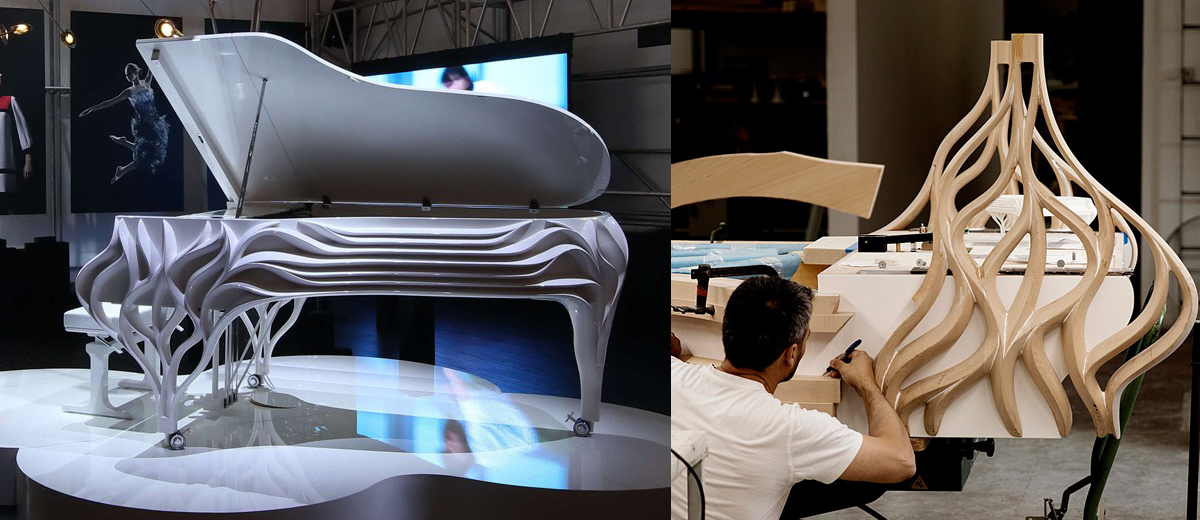
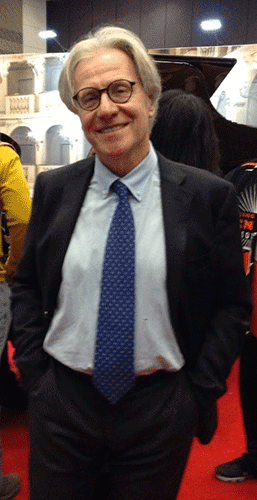
Several months ago, I had the opportunity to speak with Paolo Fazioli, founder of Fazioli Piano located in Sacile, Italy. In the realm of piano manufacturing, he’s one of the few living legends who established his own piano brand. His pianos are some of the most exquisite examples of craftsmanship and many of the world’s top performers play Fazioli pianos including Angela Hewitt, Herbie Hancock, Lucas Wong, Vladimir Ashkenazy, Aldo Ciccolini, Alfred Brendel, Lazar Berman, Annie Fischer, and Louis Lortie to name a few. Extreme quality also comes at a cost. Fazioli pianos are some of the highest priced pianos in the world and they also make the longest production grand piano measuring 10’1” (3m 8cm) long. The few opportunities I’ve had to play Fazioli pianos, I’ve always found them to be quite remarkable. Equipped with Renner actions, they have a beautiful velvety soft range for nimble playing and an incredible sense of power at the top end. Like their sense of style, the tone is bold and unabashed.
Glen Barkman: Historically, famous piano companies are steeped in tradition of over 100 years and yet you decided to design and build your own pianos in the late 70’s/early 80’s. What did you feel was missing, why you wanted to build your own instruments? Or was it simply a challenge back then to see if you could do it?
Paolo Fazioli: Actually, I have never found something really “wrong” on pianos of other brands. Very simply, I just wanted to give life to my own idea of a new grand piano.
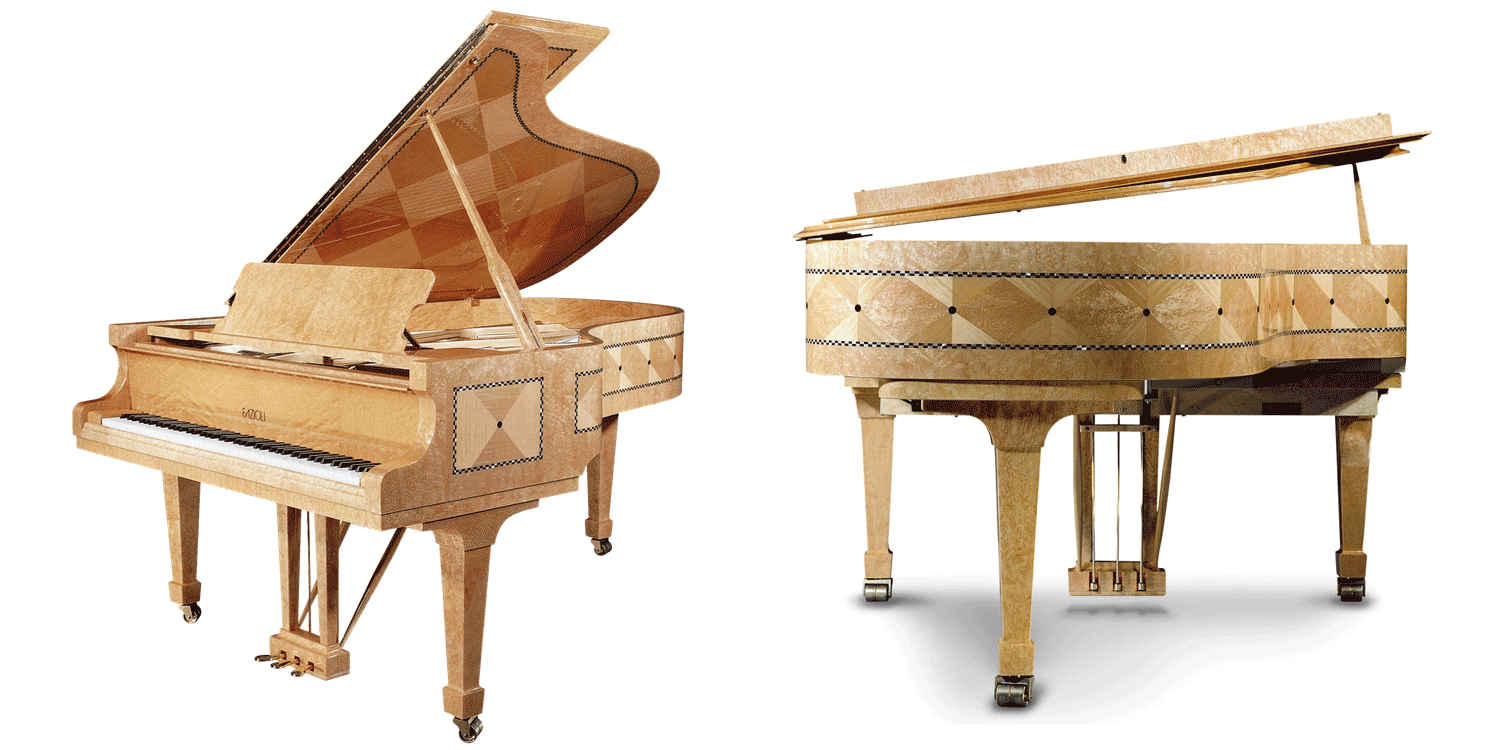 GB
GB:You have an interesting educational background – a perfect mix for piano design – a degree in mechanical engineering, a diploma in piano performance and a masters in composition. In addition, your family business built furniture out of exotic wood and so there’s this wonderful background that you had come from. When you approach piano design, which of these elements leads you – mechanical engineering, music or materials? I understand that they are all inter-related but I’m wondering how you approach the piano from the beginning? Are you looking for a sound, a certain touch or design elements as a starting point?
PF:Yes, that’s true, I learned a lot from my family and educational background, in many ways. I owe to my family my management skills, my continuous pursuit for quality, and the passion for handcraft and design. My first aim was to create a “Fazioli sound”, recognizable among others, and to improve the aesthetic look of the piano through the taste of Italian design.
GB:What are some of the unique features that make a Fazioli piano?
PF: The whole construction process is unique, based on a very exclusive combination of technology and handcraft. You should observe each detail and examine each component in order to see the uniqueness of our philosophy.
Fazioli’s published philosophy:
- Producing exclusively grand and concert grand pianos, destined to the professional market
- Excluding any imitation process and pursuing the idea of a FAZIOLI sound inspired by the Italian “Bel Canto”
- Individually handcrafting each piano (every FAZIOLI instrument is unique), refusing every industrial process
- Using only the best materials and cutting-edge manufacturing techniques
- Constantly carrying on scientific research through an internal “Research and Development” department and the collaboration with academic research institutions and external private subjects; meeting the demand of those who wish to acquire a unique and aesthetically fully-customized instrument (Art Case & Home Design collections)



 GB
GB: How have your pianos changed over the last 40 years? What are some of the subtleties that you have built upon? Were there ever pianos that you were disappointed with at the end of the process? Hand crafting – from casting the frame, building the rim, installing all of the strings and actions – you sit and play it for the first time. Have there been moments when you simply didn’t like certain design elements?
PF: We have a complex and efficient quality control process, which brings us not only to check each single component but also each phase of construction. In this way, we never get to the point of “rejecting” an instrument at the end of the process. Regarding our improvements over the years, we are constantly engaged in scientific research. We have established a new Research and Development Department employing specialized engineers completely devoted to research and experimental activities.
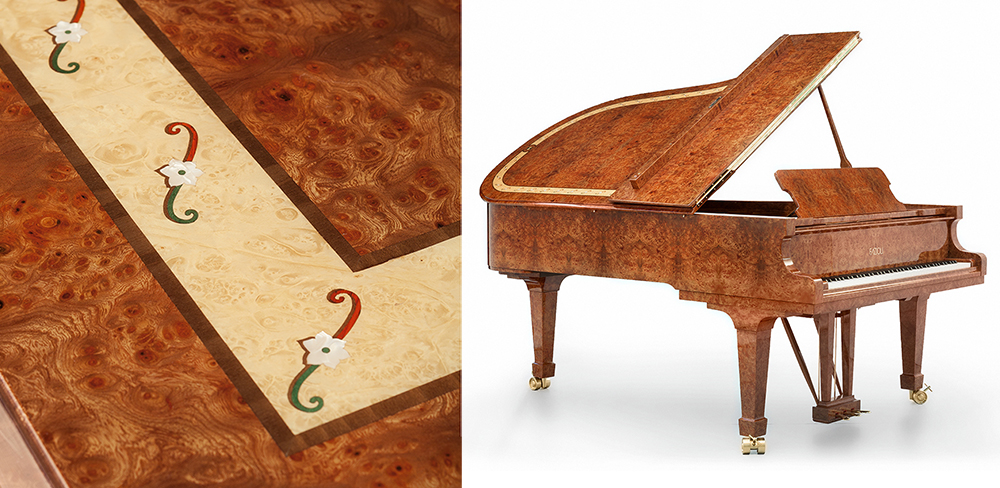
GB: Making one piano is a huge accomplishment for any one person. But starting production in a 600 meter2 facility, how did you begin to build patterns for rims, design and have cast iron frames made as well as all of the jigs made to create legs, lyres and music desks? How did you find the manpower?
PF: At the beginning of our history, a production surface of 600 m2 was enough to face the needs we had at that time. In any case, we had the important advantage of being able to use some machinery from my family’s furniture company. Since the beginning, we have trained all of our employees “internally”, basing on a training process that we have improved over the years.
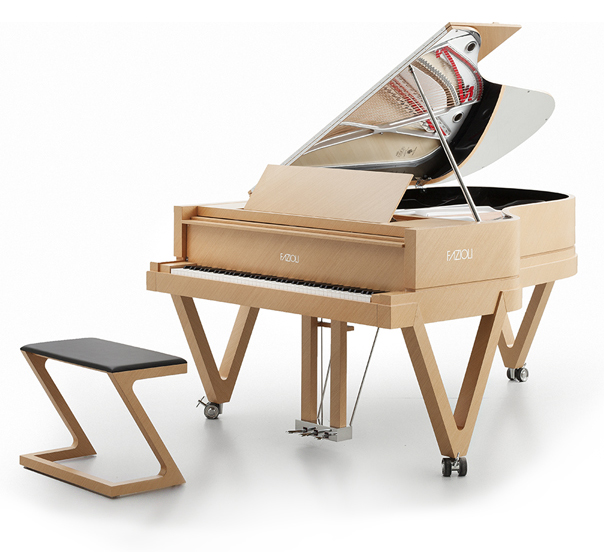 GB: What was it like when you started to go to exhibitions and people started to express their joy and satisfaction over your pianos? That must have been satisfying to experience that. Can you tell us a little about first impressions from artists?
GB: What was it like when you started to go to exhibitions and people started to express their joy and satisfaction over your pianos? That must have been satisfying to experience that. Can you tell us a little about first impressions from artists?
PF: Our relationship with pianists and artists has always been quite positive and that always meant a lot to me, as I kept on pursuing my aim looking at the future with determination.
GB: Now, 40 years later, your production facility has expanded. Your name is world renown. Your pianos, your sound, your touch is established. What do you strive for in your R&D department? What are the finer details that you wish to accomplish?
PF: The new surface is 8,200 m2 (88,000 ft2). Any endpoint is at the same time a starting point. You never stop learning and developing. This philosophy brought us to the creation of our R&D department, that must be considered a fundamental premise for the future.
Watch the Making of the Fazioli with Westbank Developers, Vancouver, Canada
GB: Italians have always been known as one of the great innovators in style. Fazioli is no exception. Your custom pianos are unique and creative. What’s the process when someone comes to you to design a one-of-a-kind piano? There will always be piano manufacturing parameters but how do you then design the piano to match décor?
PF: Very often, when we receive the draft for a new custom piano, we need to find a “compromise” between construction needs and desires in matter of design. We also try to lead the client as much as possible towards better aesthetic choices, even if this is obviously quite a matter of personal taste. However, there is something we will never compromise on and that is: quality. Custom pianos are built following the very same quality process and protocol always required by our philosophy.




GB: What does the future hold for Fazioli? Are there new models on the horizon? Does expansion interest you? What would you like to accomplish yet?
PF: My constant striving is and will always be for “quality”. It is possible that we will create new models but, more than numbers or expansions, I believe that our main concern must be the sound and the continuous technical improvement of the instrument.
Special thanks to Paolo Fazioli for taking the time to share his vision.
MORE PIANO ARTICLES
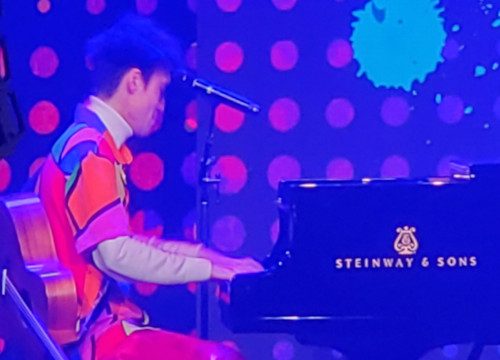
During the performance of Jacob Collier at the most recent NAMM show I was reminded that music makes us human, that beauty binds us together as a collective, and that the reason the music industry exists is to aid in the creation of art. I needed that reminder without which, the annual trade show featuring many of the great piano makers is just the sale of wares. I believe that people are feeling the uncertainty ...
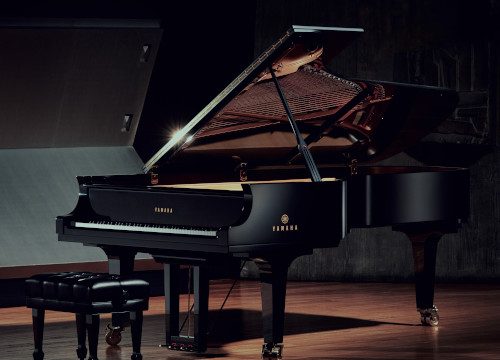
I used to have a teacher who would frequently say, “For every single grade point PAST 80%, it takes as much effort as the FIRST 80.” I believe this statement to be true from experience. The first 80 is the easiest. Chipping away at every point past that is the challenge. The bulk of the work can bring a project into shape but it’s the pursuit of excellence, that’s where the challenge lies. Yamaha is ...

The value of a piano is obvious ~ it’s the music that you make with it. But often, families are going through life changes which involve a house move and unfortunately, the piano needs to be sold. They invariably ask the question, “What are we going to do about the piano?” This question comes up because, as you can imagine, they’re not easy to move. We don’t simply pack them away in a cardboard box ...

You’ve been playing your piano for years now and the time has come to seriously consider downsizing the house and move into a condo. But what do you do with the piano? You love your piano and can’t imagine life without it and besides, you absolutely hate the idea of playing a digital keyboard. Many people don’t know that you can add digital functionality without compromising your existing piano. Yes, it is completely possible to ...
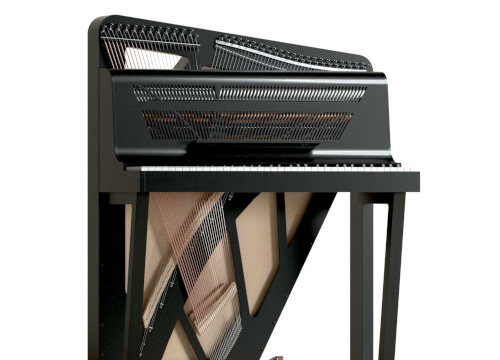
Many years ago, I remember seeing a piano in a museum similar to the one shown above (built in 1787 by Christian Gottlob Hubert. On display at Germanisches Nationalmuseum - Nuremberg, Germany). I have often wondered why acoustic portable pianos never really took off. Although we've seen more portable keyboard instruments like harpsichords, accordions or electronic keyboards, they operate completely different from a traditional piano in that they either pluck the strings, use air with ...
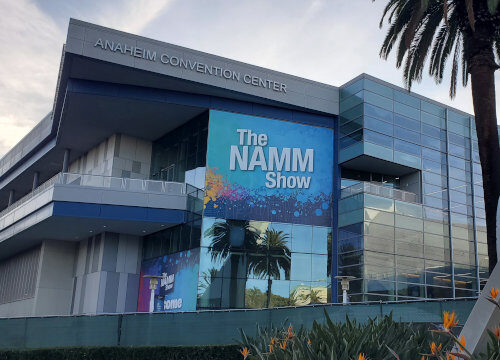
This was the first year since covid that the National Association of Music Merchants (NAMM) trade show was back to its regular January date and, in fact the first show where it felt back to normal. How was it? To answer that, I'm going quickly review the piano market over the last few years. Piano sales boomed during covid. Think about it - everyone was at home and with time on their hands, many turned ...